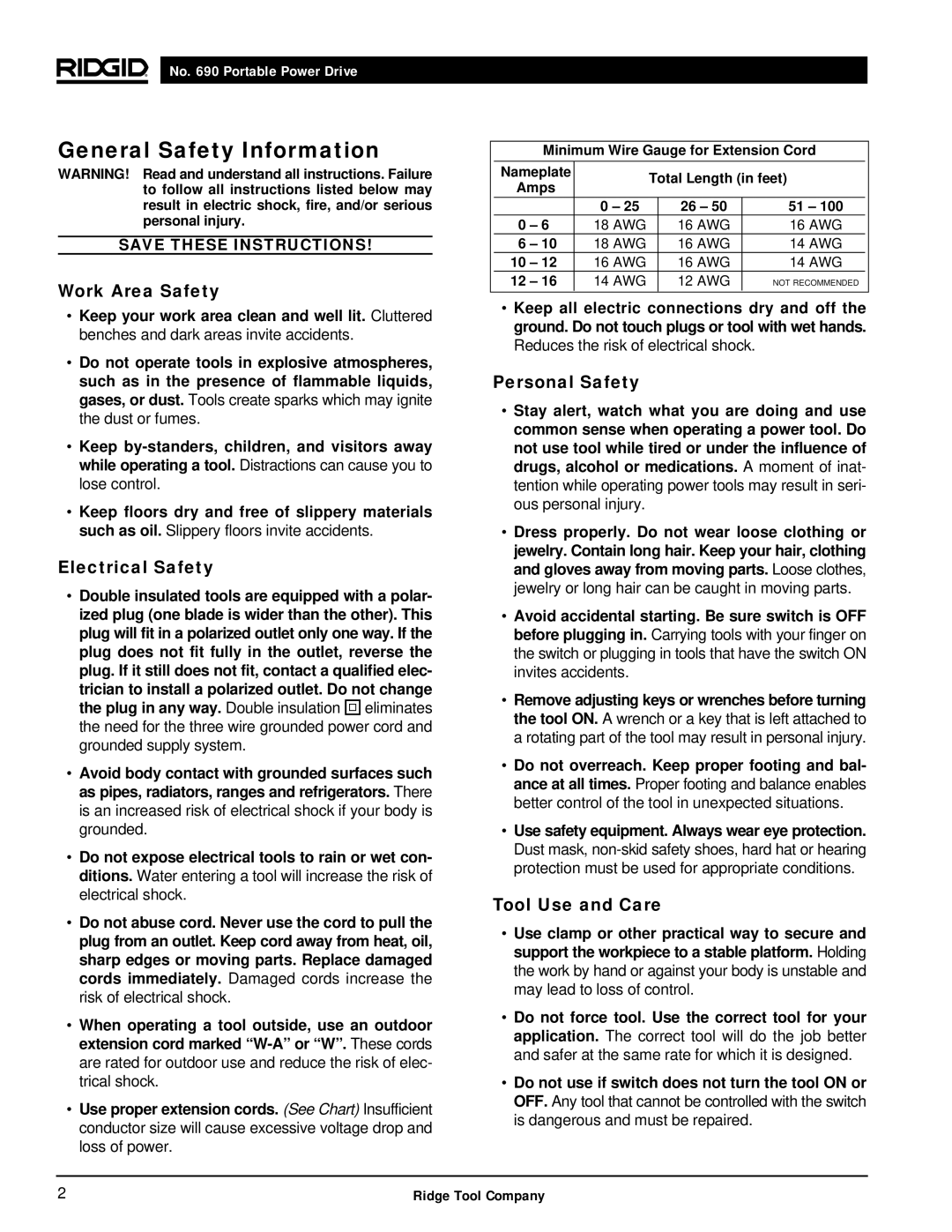
No. 690 Portable Power Drive
General Safety Information
WARNING! Read and understand all instructions. Failure to follow all instructions listed below may result in electric shock, fire, and/or serious personal injury.
SAVE THESE INSTRUCTIONS!
Work Area Safety
•Keep your work area clean and well lit. Cluttered benches and dark areas invite accidents.
•Do not operate tools in explosive atmospheres, such as in the presence of flammable liquids, gases, or dust. Tools create sparks which may ignite the dust or fumes.
•Keep
•Keep floors dry and free of slippery materials such as oil. Slippery floors invite accidents.
Electrical Safety
•Double insulated tools are equipped with a polar- ized plug (one blade is wider than the other). This plug will fit in a polarized outlet only one way. If the plug does not fit fully in the outlet, reverse the plug. If it still does not fit, contact a qualified elec-
trician to install a polarized outlet. Do not change the plug in any way. Double insulation ![]()
![]()
![]() eliminates the need for the three wire grounded power cord and grounded supply system.
eliminates the need for the three wire grounded power cord and grounded supply system.
•Avoid body contact with grounded surfaces such as pipes, radiators, ranges and refrigerators. There is an increased risk of electrical shock if your body is grounded.
•Do not expose electrical tools to rain or wet con- ditions. Water entering a tool will increase the risk of electrical shock.
•Do not abuse cord. Never use the cord to pull the plug from an outlet. Keep cord away from heat, oil, sharp edges or moving parts. Replace damaged cords immediately. Damaged cords increase the risk of electrical shock.
•When operating a tool outside, use an outdoor extension cord marked
•Use proper extension cords. (See Chart) Insufficient conductor size will cause excessive voltage drop and loss of power.
Minimum Wire Gauge for Extension Cord
Nameplate |
| Total Length (in feet) | |||
Amps |
| ||||
|
|
|
| ||
|
|
|
|
|
|
|
| 0 – 25 |
| 26 – 50 | 51 – 100 |
0 | – 6 | 18 AWG |
| 16 AWG | 16 AWG |
6 | – 10 | 18 AWG |
| 16 AWG | 14 AWG |
10 | – 12 | 16 AWG |
| 16 AWG | 14 AWG |
12 | – 16 | 14 AWG |
| 12 AWG | NOT RECOMMENDED |
|
|
|
|
|
|
•Keep all electric connections dry and off the ground. Do not touch plugs or tool with wet hands. Reduces the risk of electrical shock.
Personal Safety
•Stay alert, watch what you are doing and use common sense when operating a power tool. Do not use tool while tired or under the influence of drugs, alcohol or medications. A moment of inat- tention while operating power tools may result in seri- ous personal injury.
•Dress properly. Do not wear loose clothing or jewelry. Contain long hair. Keep your hair, clothing and gloves away from moving parts. Loose clothes, jewelry or long hair can be caught in moving parts.
•Avoid accidental starting. Be sure switch is OFF before plugging in. Carrying tools with your finger on the switch or plugging in tools that have the switch ON invites accidents.
•Remove adjusting keys or wrenches before turning the tool ON. A wrench or a key that is left attached to a rotating part of the tool may result in personal injury.
•Do not overreach. Keep proper footing and bal- ance at all times. Proper footing and balance enables better control of the tool in unexpected situations.
•Use safety equipment. Always wear eye protection. Dust mask,
Tool Use and Care
•Use clamp or other practical way to secure and support the workpiece to a stable platform. Holding the work by hand or against your body is unstable and may lead to loss of control.
•Do not force tool. Use the correct tool for your application. The correct tool will do the job better and safer at the same rate for which it is designed.
•Do not use if switch does not turn the tool ON or OFF. Any tool that cannot be controlled with the switch is dangerous and must be repaired.
2 | Ridge Tool Company |
